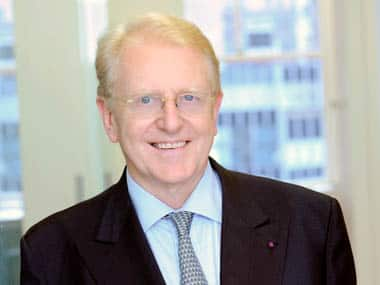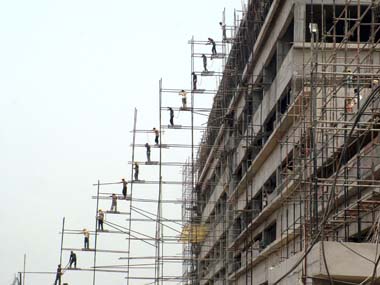New York: Will Finance Minister Pranab Mukherjee surprise the investment community by coming out with a bold budget instead of a deficit-laden one lacking pro-market initiatives?
Tushar Poddar, Goldman Sachs’ economist, is among those who think that the Congress rout in state polls will make it tougher for the government to pursue pro-market reforms that will spur growth. “The best that can be hoped for is muddle-through policies,” he told reporters.
Despite low expectations, foreign investors are honing in on this year’s budget to be presented on 16 March, to get a sense of the broader policy intent of the Manmohan Singh government.
[caption id=“attachment_243250” align=“alignleft” width=“380” caption=“India’s third quarter’s dreary performance will probably drag India’s annual growth to around 6.5 percent. Reuters”]
 [/caption]
[/caption]
“Now that the regional elections of March are behind us, it is essential for the government to press forward with bold economic reforms that will boost growth, tame inflation and make it easier for companies to conduct business. Our member companies need to see in the budget that India’s reform process is moving forward,” said Ron Somers, president of the US-India Business Council (USIBC).
The budget is being seen as a “test” of the government’s political resolve to implement reforms to rescue India’s economy which slowed to 6.1% in the third quarter of the financial year 2011-12. The third quarter’s dreary performance will probably drag India’s annual growth to around 6.5 percent.
“The budget is being prepared against a real macro-economic situation that is far from stable. In spite of these headwinds, both domestic and global investors are looking to this budget to deliver fiscal consolidation, contain subsidies and provide new measures for raising revenues,” wrote MK Venu, managing editor of the Financial Express in a BBC column.
“If the economy does not grow at the desired pace, how will the government pay for the vast and growing welfare programmes it has already committed to?” asked Venu, while noting that there was no “rational explanation” for why the government is subsidising middle class users of cooking gas and diesel vehicles. He said the actual oil subsidies, explicit and hidden, could be in the order of $30 billion this year, up from less than $10 billion in 2009-10.
Impact Shorts
More ShortsWith slowing growth and a widening current account deficit weighing on the Indian economy, Mukherjee really doesn’t have the luxury of coming out with a “standstill” budget. Analysts say opening up the highly regulated retail, defence, health and education sectors to foreign investors will boost investment flows. There is no doubt that some reforms linked to land acquisition, foreign investment rules and subsidies on fuel, are crucial to lifting investment and spending in an economy headed for its slowest growth in three years.
The writing is on the wall and the government will have to perform or perish by putting in place policies that will encourage investment.
“This setback might be the final push to convince the UPA to bring in critical supply-side reforms to improve economic prospects,” analysts at Standard Chartered Bank said in a note.
[caption id=“attachment_243255” align=“alignright” width=“380” caption=“Georges Ugeux, former NYSE executive vice president, says that India needs to have greater transparency on the tax side.”]
 [/caption]
[/caption]
Analysts say the easy option would be for the finance minister to sneak in reforms that don’t need parliamentary approval, such as raising fuel prices or permitting more foreign holding of Indian bonds through the budget.
Georges Ugeux, the former New York Stock Exchange executive vice president who now runs boutique investment bank Galileo Global Advisors, told Firstpost that India needs to have greater transparency on the tax side.
“India wants foreign investment but has created absurd legislation on the tax side. If a promoter wants to sell an asset to another company in his group there are a lot of taxes. You need tax transparency so the promoter is taxed once and not several times. The reorganization or restructuring in a group should be tax neutral,” said Ugeux.
The Mint newspaper said “Mukherjee will find it difficult the play the reform card and push the proposed direct taxes code and the goods and services tax. Still, nothing can prevent him from expanding the scope of the service tax, raising excise duty and taking a hard look at subsidies.”
See Firstpost’s Budget 2012 videos and expert views: Ajay Shah , Rupa Rege Nitsure , Indranil Pan , Ashima Goyal , Jim Walker , DK Joshi , Ajit Ranade , Art Woo .
**See Firstpost’s Budget 2012 issue based videos:** Subsidies , Fiscal Deficit , Inflation , Taxation.
)